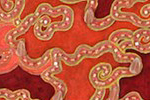Summer 2015: Young Voices
Somewhere
by Danrong Wang
I cannot name or picture it correctly, nor can I point you to the exact way there. It is there, but it is not. Memories scramble up like a chaos full of cacophonies, the most harmonious combination of cacophonies: ice-cold water dripping over the well, the nasty smell of the pigsty, and the choking smoke rising from the chimney all the way to the purple red sky.
When I was young, maybe under the age of seven, I woke up in the twitters of sparrows, embraced by a mass of golden warmth. I reached to the other side of the bed; grandma had gone to the fields. She always had a ton of work to do — a habit kept from the Great Leap Forward, when it was all about working, all about the community. That had not changed even until now, when all the farming lands were either leased or exploited as residence areas. She is the typical kind of person growing up in the 1940s, who is always concerned about tomorrow.
The room had the somberness as all the aged houses did. The only light came through the thick greenish glass of small private factory quality, and was reflected by another tabletop glass plate of the same kind. Grandma used the glass plate to protect the fragile wooden desk. Beneath it was a moth-eaten, cheap, lacy tablecloth. And on top of the table cloth were pictures: pictures of my grandparents on their wedding day; of my mother and her siblings on their wedding days; of me and my cousins on the 100th day of our birth; and of us when we grew up a little bit, standing in a row by the gate and posing like door-gods. Cameras weren’t as good back then. That young, smiling woman whose eyes had not become triangle-shaped because of the saggy eyelid, whose cheeks were chubby instead of sunken and whose hair was still like satin, must not be grandma. She couldn’t have changed that much in the past years.
Not long after I woke up, grandma came back from the fields and held my hands to go down the uncovered, bleak stone steps. It was the part I hated the most of the house. While stepping on them, a sense of chill mounted up my feet as if a ghost was grabbing my foot. I shivered. Grandma held me tighter.
She was going to cook me breakfast. There were no stoves, but a huge black wok that lay inside the counter, and fire burning wood into red flame and sparkles, and ultimately embers. A grey, choking smoke would arise from the fire and obscure the tiny figure behind. Grandma poured cold water into the huge iron wok, and it splashed at the second it touched the heating iron. A white mist rose up and soon hid itself in the smoke. Grandma used the long old tongs to poke the firewood. The front of the black old tongs was heated to red as firewood sputtered. I started coughing and grandma pushed me out of the kitchen.
“Just play by yourself for a while. Breakfast will be soon.” I went out. The smoke rose from the chimney and climbed and climbed towards the sunlight leaking out of a crack in the cyan smoke-like clouds as if it were trying to reach the new-born sun. While it was about to reach the silver lining, it disappeared — dissipated into the flimsy clouds.
There were not many things in the yard. Chickens were still asleep in the wooden coop next to two one-storey storage rooms. The yard had no fences, relying on the storage rooms and a short wall to keep some privacy, or actually, it didn’t care about the privacy at all. Beyond the short buildings was a one-lane-wide driveway; cars and tractors could barely drive through. And farther beyond were vast lands of crops, vegetables, and plants that had green leaves, half buried in the earth and that I could not name. And vast lands went on and on to the end of my view. Wind suddenly rose from nowhere, rustling before I could feel it. Then it actually came, gently touched the tips of the plants and rushed through my whole body. I could smell dirt, grass, cooking smoke from another chimney, and the pigsty down the road.
I wondered if the wind came from the little secret col on the hill where grandma farmed. I had never been there. She would not let me. I dreamed about what it would be like all the time. In between two peaks of the hill was this little piece of land covered with black soil. Chinese cabbages grew alongside of cowpeas. And beyond the cowpeas was an empty land. Grandma would tuck her hands into that piece and dig out sweet potatoes. Air smelled different there because there was no pigsty or cooking smoke or cars driving by. It would have a refreshing smell of soil and grass and the sweet odor of wild flowers brimming on the edges of the farming lands. Orioles would twitter and echo in the mountains. And then wind would be generated. Standing in the col would be like standing in the center of a hurricane. Roars of the storm would pour out of ears, yet the wind would be so gentle, like a soft hug.
Every morning, grandma would put the vegetables on two grass-woven plates and carry them back on a shoulder pole to sell. My parents had tried to stop her, and they couldn’t, just like they could not stop birds from flying or fish from swimming.
“Honey, could you get me some water from the well?”
I went to the well that stood in the middle of the yard. I put the white bucket down, watched it filled with water, and pulled it up. I was not strong enough back then so a third of the water spilled on the slates and dyed them to a darker color.
I carried the bucket back to the kitchen, staggering, letting the water drip and dot the way back home.
| |

|

|
 |
 |
 |
 |
 |
||||
|
As hot as the summer sun, 13 poets breathe light into the darkness. |
Tending to the worn, imperfect edges of life, five writers grapple with perimeters. |
Like a swarm of bees or a flock of birds: four artists layer meaning through detail. |
Four teens observe their world and put words to page like only young voices can. |
From emerging to established writers – meet the women behind our seventh issue’s voices and visions. |

